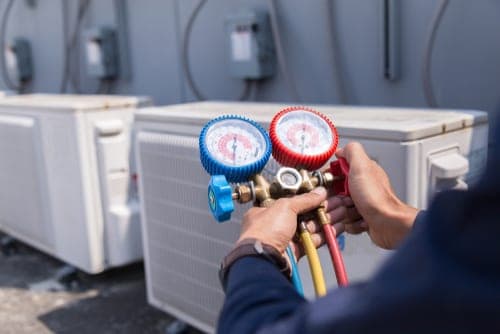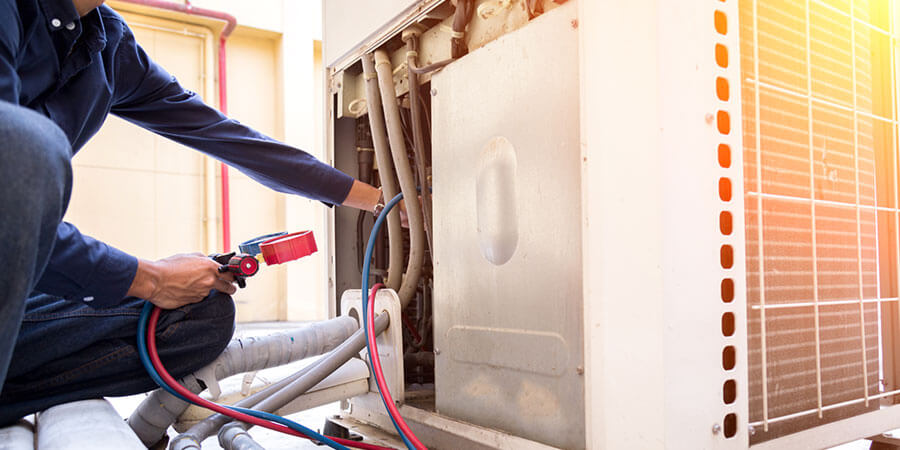Comfortable Living Made Hassle-Free with Solutions from DMAKS HVAC.
Comfortable Living Made Hassle-Free with Solutions from DMAKS HVAC.
Blog Article
Energy-Efficient Cooling And Heating Systems to Reduce Energy Expenses
As energy prices proceed to rise, the relevance of energy-efficient A/c systems becomes significantly apparent. These systems not just promise significant savings on energy bills however likewise add to a more lasting future by lessening power intake.
Advantages of Energy-Efficient Cooling And Heating Solutions
Energy-efficient HVAC systems provide numerous benefits that expand past simple expense savings. One significant advantage is the minimized ecological effect. By eating much less energy, these systems add to decrease greenhouse gas discharges, helping to fight environment adjustment and promote sustainability. This lines up with raising societal needs for environment-friendly practices in domestic and business setups.
Additionally, energy-efficient heating and cooling systems often provide enhanced convenience degrees. A lot of these systems feature innovative technology that enables for far better temperature control and improved air top quality (DMAKS HVAC). This brings about a healthier interior atmosphere, which is particularly crucial for people with allergies or respiratory system issues
Moreover, buying energy-efficient heating and cooling systems can enhance residential property worth. As even more consumers prioritize energy performance, homes and structures furnished with these systems may bring in greater bids in the realty market.
Types of Energy-Efficient HVAC Options
Just how can home owners and organizations choose the most ideal energy-efficient cooling and heating alternatives for their requirements? The market supplies a range of energy-efficient heating and cooling systems, each designed to boost convenience while reducing power usage.
One option is the variable cooling agent flow (VRF) system, which efficiently regulates the temperature in numerous zones within a structure. This system adjusts its refrigerant circulation to match the desired temperature level, resulting in significant power savings.
One more prominent choice is geothermal heatpump, which make use of the earth's steady temperature level to heat and great spaces. By transferring warmth to and from the ground, these systems demonstrate remarkable effectiveness, specifically in moderate environments.
Additionally, ductless mini-split systems provide an energy-efficient choice for homes lacking ductwork. These systems enable zone-specific cooling and heating, minimizing energy waste in empty areas.
Finally, high-efficiency heaters and ac system, with innovative SEER and AFUE ratings, provide reliable climate control while taking in much less power than conventional designs. By reviewing these options, house owners and organizations can select an a/c system customized to their specific needs and energy effectiveness objectives.
Trick Features to Consider

Following, investigate the sort of compressor used in the system. DMAKS HVAC. Variable-speed compressors can readjust their output to match the home heating or cooling demand, leading to enhanced comfort and energy cost savings contrasted to single-speed versions. In addition, try to find systems equipped with wise thermostats that offer programmable settings and remote accessibility, permitting for far better control over energy intake
An additional essential feature is the system's air filtration capability. High-efficiency filters can improve indoor air quality and reduce power intake by ensuring the system operates efficiently. Consider the kind of cooling agent utilized; modern systems frequently employ eco-friendly cooling agents that have a reduced environmental impact.
Lastly, guarantee that the system works with zoning modern technology, which permits for personalized temperature control in different locations of your home, improving comfort while minimizing energy usage.
Tips for Choosing the Right System


Following, take into original site consideration energy efficiency ratings, specifically the Seasonal Energy Efficiency Proportion (SEER) for cooling down systems and the Annual Gas Usage Performance (AFUE) for furnace. Higher rankings suggest greater performance, which can cause significant financial savings on utility bills gradually.
Furthermore, evaluate the kind of heating and cooling system that best fits your lifestyle and spending plan. Choices include main air conditioning, ductless mini-splits, and heatpump, each with its very own set of benefits and drawbacks.
Do not neglect the relevance of appropriate installment and sizing; an improperly sized system can lead to ineffectiveness and increased wear. Finally, seek advice from an expert cooling and heating specialist to obtain professional referrals tailored to your home's one-of-a-kind requirements. This thorough technique will ensure that you choose an energy-efficient a/c system that satisfies your demands and spending plan successfully.
Upkeep for Ideal Performance
Once the best cooling and heating system is in place, continuous upkeep comes to be vital to ensuring ideal effectiveness and longevity. A well-kept system runs better, resulting in lower energy usage and decreased energy expenses. Routine assessments and tune-ups need to be set up at the very least twice a year-- as soon as prior to the air conditioning period and as soon as prior to the home heating season.

Property owners need to likewise be vigilant regarding checking their heating and cooling system's efficiency. Unusual sounds, fluctuating temperatures, or raised energy expenses can indicate underlying problems that call for immediate interest. By dealing with these concerns promptly, homeowners can prevent pricey repairs and prolong the life-span of their systems.
Purchasing this hyperlink a maintenance plan with a certified technician not only improves performance yet also offers comfort, recognizing that the system is running at its best. DMAKS HVAC. Regular maintenance is as a result crucial for sustaining energy efficiency and minimizing general functional prices
Verdict
Finally, energy-efficient heating and cooling systems provide a feasible option for lowering energy costs while boosting convenience and air top quality. By including innovative modern technologies and alternatives such as geothermal warm pumps and ductless mini-splits, homeowner can accomplish considerable energy financial savings and add to environmental sustainability. Mindful consideration of system features and continuous upkeep better makes sure ideal efficiency, making energy-efficient systems a sensible financial investment for both economic and environmental benefits.
Report this page